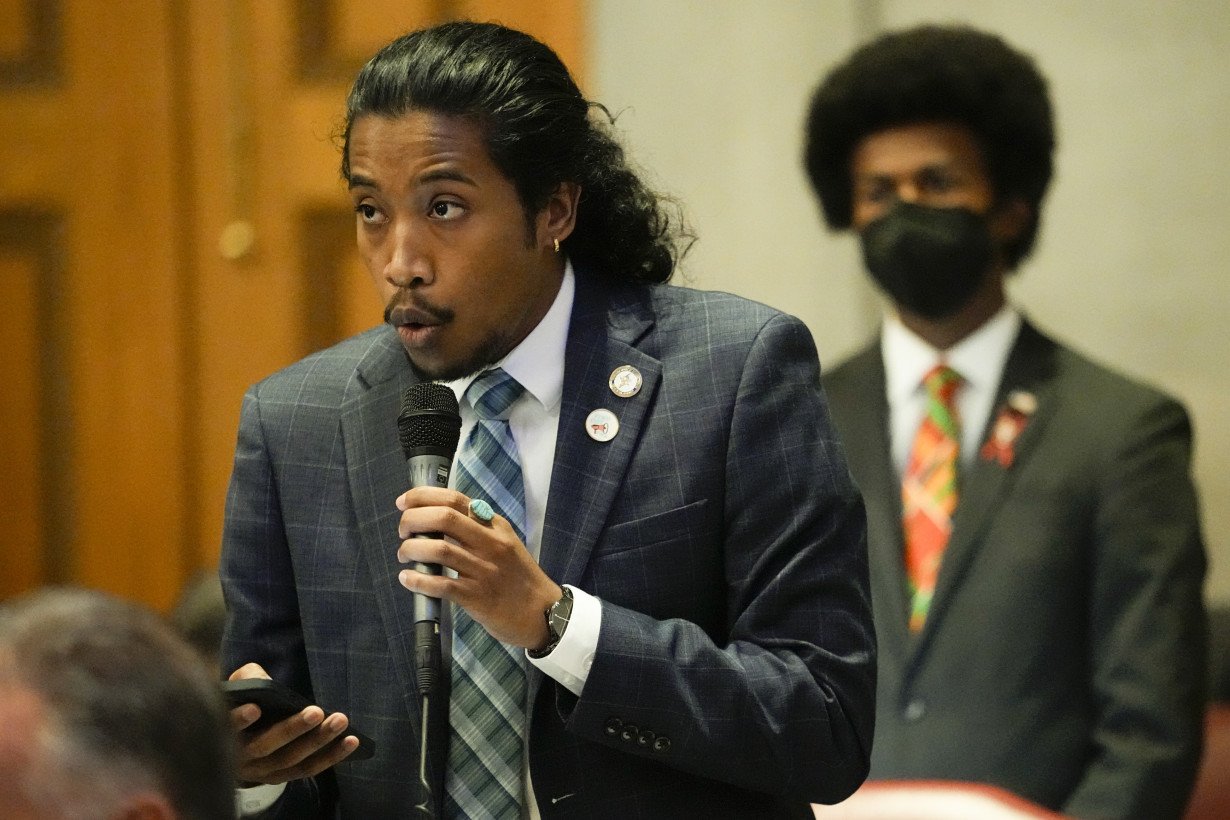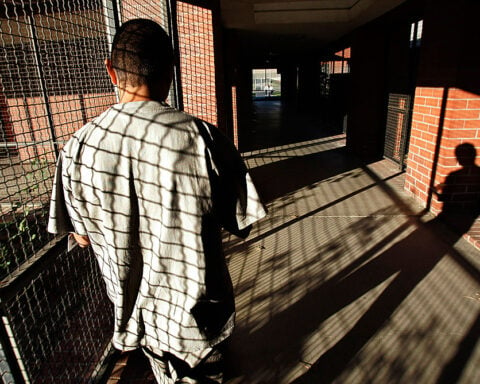NASHVILLE, Tenn. (AP) — Tennessee Democratic Rep. Justin Jones filed a federal lawsuit Tuesday challenging his expulsion in April and the House rules restricting lawmakers' floor comments that Republicans applied to silence Jones for part of one day in August.
Filed against House Speaker Cameron Sexton and House administrative officials, the lawsuit in Nashville federal court argues that Republicans have repeatedly blocked Jones from speaking during debate in violation of free speech rights under the state and federal constitutions.
Additionally, the lawsuit by the Nashville member of the “Tennessee Three” contends his constitutional due process rights were infringed upon by the expulsion proceedings.
Republicans ousted Jones and Rep. Justin Pearson, a fellow young Black Democrat, over their megaphone-amplified protest calling for gun control on the House floor just days after a Christian elementary school shooting killed six people. Republicans spared Democratic Rep. Gloria Johnson, who is white, from expulsion for her role in the demonstration by one vote.
Jones and Pearson were quickly reappointed and then reelected in special elections, each attracting a wave of campaign donations over the few days they were out of office. Jones, Pearson and Johnson were propelled into the national spotlight.
Beyond seeking that the expulsion and the House rules on debate be declared unconstitutional, the lawsuit also says Jones should be returned to a committee from which he was removed; restored other benefits, including his seniority level pre-expulsion and a full year's credit in the state's retirement system; and awarded other damages and costs.
GOP leaders have said the expulsions were necessary to avoid setting a precedent that lawmakers’ disruptions of House proceedings through protest would be tolerated. They said the new House rules promote civility, respect and accountability.
Sexton's office did not immediately respond to a request for comment. A spokesperson for the Tennessee attorney general, Amy Wilhite, said the office was aware of the lawsuit but hadn't received a copy from Jones' attorneys yet.
The lawsuit seeks to prevent Sexton and the state “from continuing to suppress dissent, whether through the updated House rules or otherwise, and to seek full restoration of the benefits, rights, and privileges that they illegally stripped from him (Jones) in retaliation for his protected speech.”
The new House rule aimed at punishing disruptive members was approved for the August special session called by Republican Gov. Bill Lee in response to the deadly March shooting at The Covenant School. The rule allows members to be silenced anywhere from a day to the rest of the year for not sticking to the bill being debated.
On the day the House voted to silence Jones, Sexton had warned Jones about calling a Republican's bills “reprehensible,” “asinine,” and “insulting." Sexton twice ruled him out of order for saying lawmakers should “stop trying to put more guns to start a gun fight in our schools that would not protect our children. What is one little Glock against an AR-15?”; and then saying the state should better fund mental health in schools and increase teacher pay instead of putting more police in schools.
In addition to the limits on debate, House Republicans also instituted a ban on the public holding signs during floor and committee proceedings. A Tennessee judge blocked the sign ban from being enforced after agreeing with civil rights activists that the prohibition likely violated free speech rights. The state in response wrote that the judge “prohibited duly-elected legislators from enforcing their own duly-enacted rules.”
Only a few bills passed during the tense special session, and none of them made any significant gun control changes. There was no consideration of a proposal to keep firearms away from people who are judged to pose a threat to themselves or others, which the Republican governor, Bill Lee, has supported.
The session also ended in acrimony when Sexton and Pearson appeared to have a brief physical interaction where both accused each other of shoving moments after the House adjourned. Pearson and Jones had approached the speaker’s dais each holding a sign calling for gun control.
Jones is represented in the lawsuit by onetime U.S. Attorney Jerry Martin and attorneys from a law firm that includes former U.S. Attorney General Eric Holder. Holder has served on Jones’ legal team for several months.

 AAPI adults prioritize immigration, but split on mass deportations: AP-NORC/AAPI Data poll
AAPI adults prioritize immigration, but split on mass deportations: AP-NORC/AAPI Data poll
 Nippon Steel wants to work with Trump administration on US Steel deal, Mori tells WSJ
Nippon Steel wants to work with Trump administration on US Steel deal, Mori tells WSJ
 BOJ will raise rates if economy, price conditions continue to improve, Ueda says
BOJ will raise rates if economy, price conditions continue to improve, Ueda says
 After cable damage, Taiwan to step up surveillance of flag of convenience ships
After cable damage, Taiwan to step up surveillance of flag of convenience ships
 As fires ravage Los Angeles, Tiger Woods isn't sure what will happen with Riviera tournament
As fires ravage Los Angeles, Tiger Woods isn't sure what will happen with Riviera tournament
 Antetokounmpo gets 50th career triple-double as Bucks win 130-115 to end Kings' 7-game win streak
Antetokounmpo gets 50th career triple-double as Bucks win 130-115 to end Kings' 7-game win streak
 Zheng loses to No 97 Siegemund, Osaka rallies to advance at the Australian Open
Zheng loses to No 97 Siegemund, Osaka rallies to advance at the Australian Open








